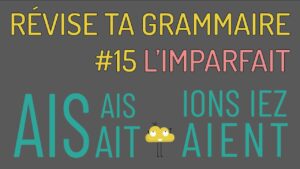The French Subjunctive Demystified: How To Master the French Subjunctive for Beginners
- Salut Susan! So... dare I ask if you've practiced the French subjunctive this week?
- Well... I was really busy this week... and my cousin was visiting and... I kinda ran out of hours in the day...
- So would you say that... you wish that you had more time?
- Oh mon Dieu, is that a lame segue into the subjunctive mood? I've heard that it's used to express wishes.
- I'm going to teach you more than just how to express your wishes! As you'll soon realize, the subjunctive is the French language's Swiss army knife!
- Allons-y, I'm ready!
A Hypothetical Mood
The subjunctive is used to express hypotheticals such as opinions, desires, emotions, or something that's uncertain. We have the present (le subjonctif présent) and past (le subjonctif passé) tenses. The subjunctive is always used in a sentence with main (independent) and subordinate (dependent) clauses that are linked by “que”.
*check this video from the beginning to 2.16
The English language also has a subjunctive mood, but it can be hard to remember when it's used.
That's because in English it's very easy to avoid the subjunctive. An example would be: "If I were you, I wouldn't bother". I think it's easier to learn it like it is in French than to try and directly link it to its English counterpart.
Another useful example can be found here [2:15] in this video.
A Sweet Mood
- Every part of French grammar can be easily mastered with practice.
There are a lot of irregular verbs and forms in French grammar and the subjunctive mood is not an exception. It's easy to mix up different conjugations, especially when they're similar to one another.
However, once you've understood the logic behind it, it'll be a piece of brioche! Do you know what a brioche is?
- Why do I feel like there's a Marie Antoinette reference is coming?
- Not a fan of royal humor?
- Can't say that I am...
- Qu'ils mangent la brioche!
- Okay...
- That's what Marie Antoinette said when she was told that the peasants didn't have any bread to eat.
- Yes, I'm familiar...
- Well, in that case, you're familiar with the subjunctive mood as well!
* "Let them eat cake!"
Subjunctive Conjugations
In the French subjunctive mood conjugations, we have two main groups of verb conjugations. The regular French verbs (-er, -ir, and -re endings) and the irregular ones (there are multiple subgroups, but let’s leave that alone for now).
Regular Conjugations
When we want to conjugate regular French verbs into the subjunctive mood, we need to remove the present tense endings -ent, and add the following subjunctive endings:
-e, -es, -e, -ions, -iez, and -ent.
Like this:
- Il faut que je parle (parler)
- Il est impossible que tu finisses (finir)
- Il est regrettable qu'Il/elle/on vende (vendre)
- Il semble que nous partions (partir)
- Il est important que vous mettiez (mettre)
- Il est intéressant qu'ils/elles couvrent (couvrir)
Video example [1.24-2.44]
Irregular Conjugations
Even though there are a lot of irregularities in French, there's one that we can distinguish that has a rule in the subjunctive: verbs that have different stems in the present tense for the singular and plural parts.
In this case, the base of the first person plural of the present indicative serves to build the first and second person plural of the subjunctive. For example, the first person plural of the present tense of the verb "venir" is nous venons. When you take the stem ven- and add the correct ending, you get nous venions, vous veniez.
Video example [2.45-3.18]
The base of the third person plural in the present indicative is used to form the other persons in the subjunctive. Using the same verb, the third person plural of the present indicative is ils viennent. When you take the stem vienn- and add the correct ending, you get je vienne, tu viennes, il vienne, ils viennent).
So just use the Indicative “we” to form the Subjunctive “we”/”you”; and the Indicative “they” to form the Subjunctive "I", "you", "he/she/it" and "they" conjugations:
| Boire | Croire | Devoir Prendre Recevoir | |
|---|---|---|---|
| je | boive | croie | doive prenne reçoive |
| tu | boives | croies | doives prennes reçoives |
| il/elle/on | boive | croie | doive prenne reçoive |
| nous | buvions | croyions | devions prenions recevions |
| vous | buviez | croyiez | deviez preniez receviez |
| ils/elles | boivent | croient | doivent prennent reçoivent |
It doesn't matter if the verb's stem changes in the subjunctive, these endings are still the same:
| Faire | Savoir | Pouvoir Aller Vouloir | |
|---|---|---|---|
| je | fasse | sache | puisse aille veuille |
| tu | fasses | saches | puisses ailles veuilles |
| il/elle/on | fasse | sache | puisse aille veuille |
| nous | fassions | sachions | puissions allions voulions |
| vous | fassiez | sachiez | puissiez alliez vouliez |
| ils/elles | fassent | sachent | puissent aillent veuillent |
Auxiliary Verbs: Avoir and Être
Unfortunately, the verbs être (to be) and avoir (to have) are always irregular so there's no trick for these. The good news is that, since they're auxiliary verbs, you'll practice them more than any others in your daily conversations.
Here are their conjugations in the present subjunctive:
| Avoir | Être | ||
|---|---|---|---|
| je/j' | aie | sois | |
| tu | aies | sois | |
| il/elle/on | ait | soit | |
| nous | ayons | soyons | |
| vous | ayez | soyez | |
| ils/elles | aient | soient |
That's great, but...
- You do realize that you've just taught me how to conjugate verbs in the subjunctive but I still don't know when to use it, right?
- Ah, pardon! I got carried away. It's simple, though. You use the subjunctive to express wishes, opinions, needs, anything in the hypothetical realm, really.
There are common expressions that can help you remember when to use the subjunctive. Maybe this video example [0.40-1.32] will help you with that.
You can also find a list of expressions that require the use of the subjunctive here.
The subjunctive is a verb mood used in subordinate clauses introduced by verbs or verb constructions that express:
- a wish or a piece of advice: je voudrais/ je souhaite/ j'aimerais/ je veux qu'il parte;
- a feeling (joy, sadness, regret): je regrette, je suis désolé, je suis triste/heureux/content qu'il parte;
- a command or request: le professeur exige/demande/ordonne que nous sortions;
- doubt or fear: je doute/ je crains/ j'ai peur que Paul ne* vienne ce soir.
* In this last sentence, "ne" is not a negation, it's used before the verb expressing fear or doubt like we would say in English: "I'm afraid of not arriving on time".
- God, I wish you could just upload the subjunctive into my brain, like in "The Matrix".
- Well, you can. It's just not as immediate. It's called studying and practicing.
- Non.
And speaking of "non"...
- Do you know how to use the subjunctive in its negative form?
- How surprised would you be if I said yes?
- Très. But you should, because a negative sentence in the subjunctive is the same as any other. We use "ne (...) pas" as a negation form, where "ne" comes before the verb and "pas" comes after the verb.
So, if I want to say that it's not that obvious that you understand me, I'll say "Il n'est pas évident qu'elle comprenne".
Check how the structure "ne" + infinitive verb + "pas" + subjunctive clause is always the same:
- Je ne dis pas qu'il vienne.
- Nous ne sommes pas certains qu'ils suivent le cours.
- Ce n'est pas qu'il s'en aille.
Cheat Sheet
- So, now that you understand when and how to use the subjunctive, let me hand you a cheat sheet.
- Oh, thank God!
- See? I'm not that bad! Ninety-nine percent of the time when you see the following expressions, the subjunctive will follow:
- Il est naturel que tu tombes.
- Il est juste que tu te trompes.
- Il est normal que je suis fatiguée.
- Il est urgent que vous alliez en vacances, vous êtes fatigués.
- Il est rare que mon enfant dorme pendant la nuit.
- Il est dommage que tu travailles pendant les vacances.
- Il est utile qu'ils sachent conduire.
- Il est surprenant que tu ne conduises pas.
- Il est étonnant que tu parles français.
- Il est étrange que Pierre ne m'appelle pas.
- Il est douteux que Marine ne soit pas en retard.
- Je veux que tu te dépêches.
- Il faut que tu fasses ton devoir.
- Il se peut qu'il pleut demain.
- Je voudrais que tu viennes.
- Il vaut mieux qu'ils se calment.
- Il a peur que papa ne vienne pas.
- Il est essentiel que/ il est important que/ il est nécessaire que nous apprenions.
- Il est impératif que t'ailles chez le médecin tout de suite.
- Il est possible que tu saches.
- Il est peu probable que nous allions au restaurant.
- Aimer mieux que…

When in doubt...
For me, one of the most beautiful things about learning a new language is how much it tells us about its people. And the French language is no exception. To understand French grammar is to understand how French people think.
Your brain will end up shaping itself after the patterns that it finds in the different languages that you learn and that will wildly benefit you in every aspect of your daily life. By learning a new language, you're effectively training your brain to become more versatile.
And it's not only you adapting to the language. With time and practice, you'll soon be able to adapt the language to your personality, becoming symbiotic with it. And the French subjunctive is just another tool that French makes available for you.
Then, once you're fluent enough, you'll be able to tell if using the subjunctive in your day-to-day conversations is something that resonates with you. And, if not, you'll be able to find alternatives within the language.
- For instance, you can use an infinitive as a replacement. Instead of saying "Il faut que je parte", you can say "Il faut partir". In this case, we just used the infinitive and deleted "je". Got it?
- Think so... So, instead of "Il est temps que je parte", can I say "Il est temps de partir"?
- Exactement! The latter sounds much more commanding so use it strategically. You can even change the phrase completely! Instead of saying "je suis content que tu viennes," you can say "tu viens, super"!
- Super!
Subjunctive Travels
- So, Susan, imagine you're traveling.
- Can't I imagine that I'm asleep instead?
- Non! Il faut que tu utilises ton subjonctif!
- I know, mais je voudrais que je sois au mon lit, endormi.
- I know you would rather be in your bed asleep now but see? You've already used the subjunctive! Très bien! Where would you like to travel to in France?
- Je veux aller à Paris. Je voudrais qu'il fasse beau quand je visite Paris! (I want to go to Paris. I wish that the weather is nice when I go to Paris.)
- Nice job! You seem to know when to use the subjunctive, and when not to use it! Il est dommage qu'il pleuve à Paris souvent! (Too bad that it often rains in Paris.)
- Oui c'est dommage, il est essentiel que je prenne mon parapluie avec moi." ("Yes it's unfortunate, it's necessary that I bring my umbrella with me.)
- Il est quand même possible qu'il ne pleuve pas! (It's also possible that it won't rain!)
- Je préfère que nous allions à Paris ensemble! That way you would help me speak French!
- I know you'd like to go to Paris together, but I gave you the wings, now it's time for you to fly.
Au revoir, Shoshanna!
- My name is Susan, not Shoshana…
- Ne t’en fais pas.
- Wait, was that another reference?
- Peut-être.
- Was that a reference to Inglorious Bastards?
- Oui!
- So, in your reference, are you that despicable character played by Christoph Waltz?
- Hmm…
- You didn’t think it through, did you?
- I did not… Attends! Are you trying to make me feel bad?
- Well, you did make me learn the subjonctif… And now I have a headache!
- You can rest now, don’t worry, I’ve taught you all the basics of the subjonctif. Now you just need to practice.
- I’ll practice with a cold towel on my head…





